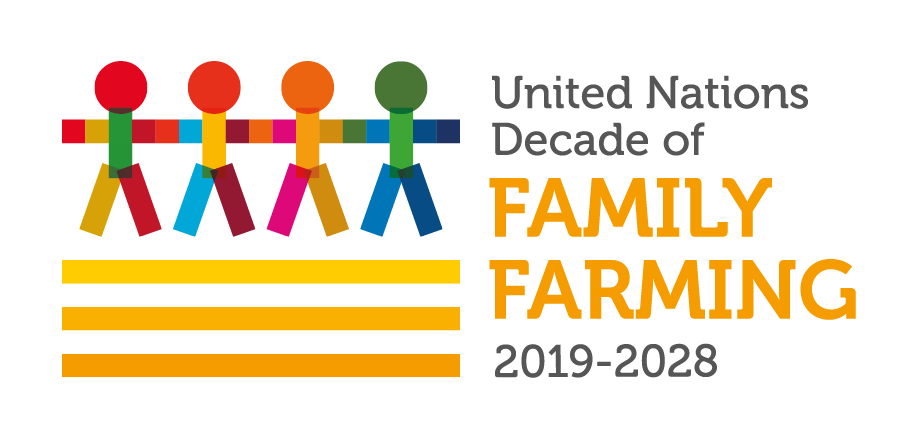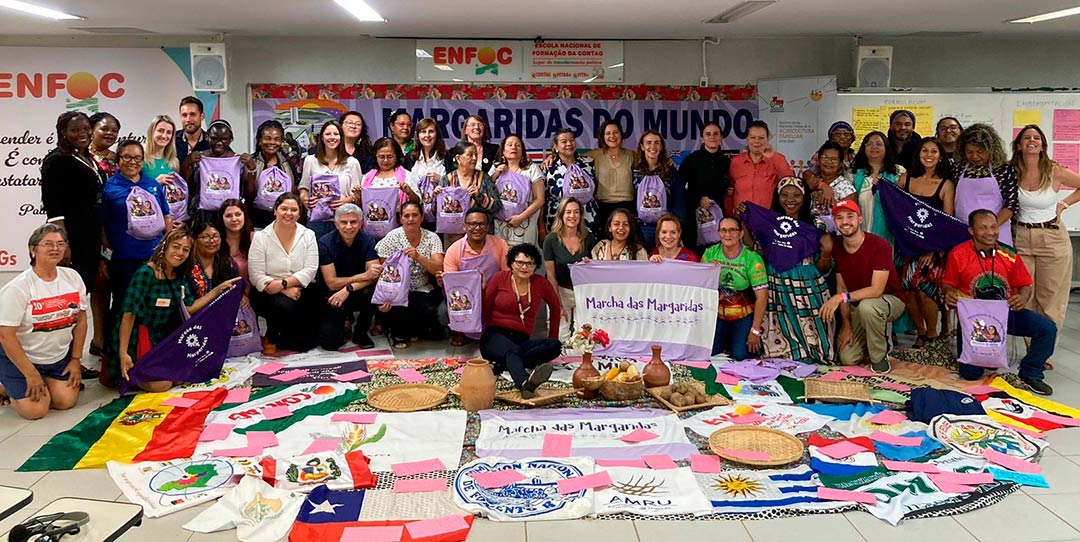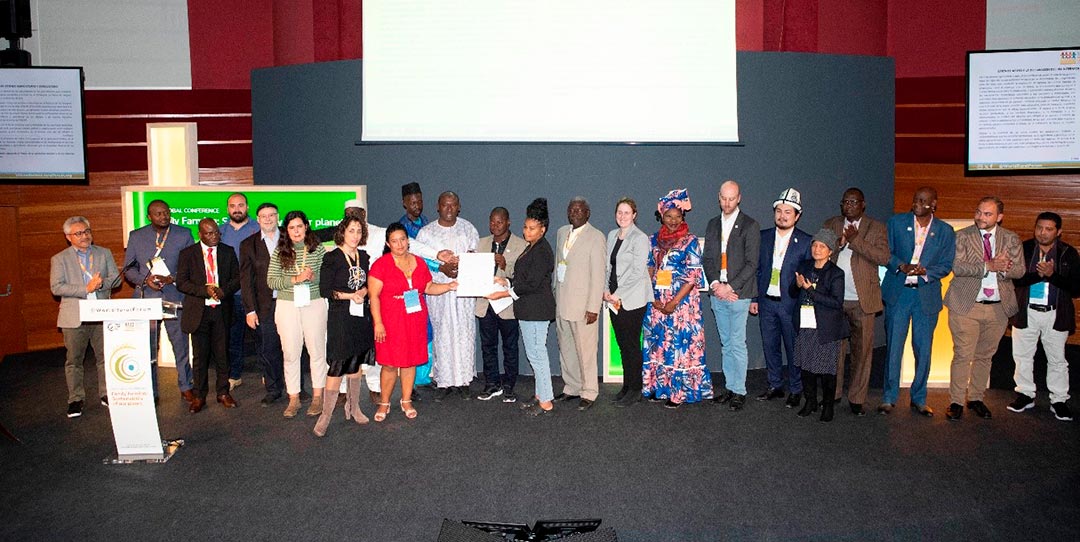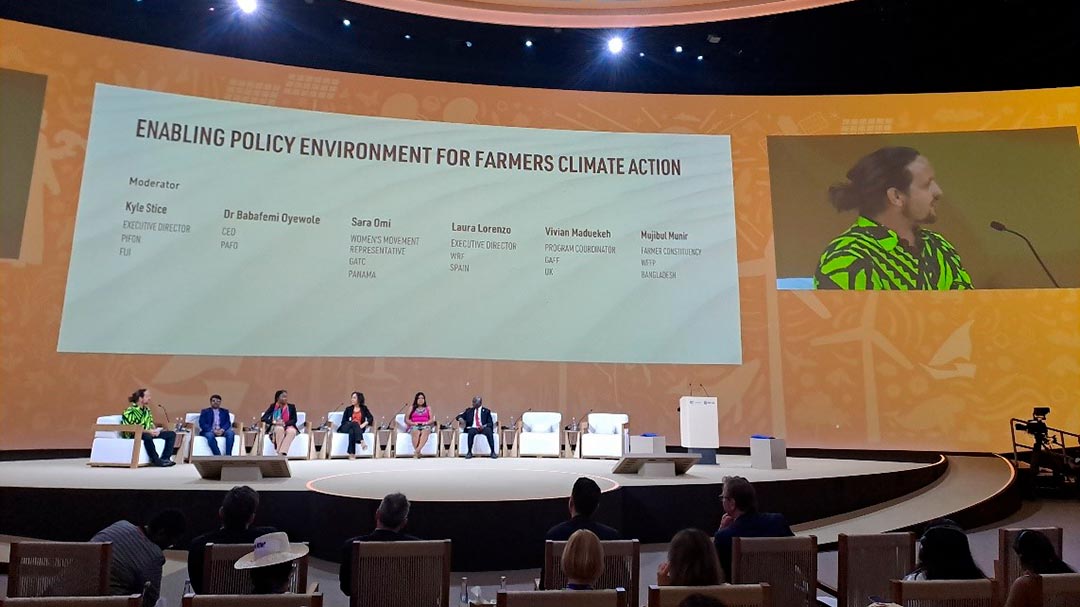The United Nations Decade of Family Farming 2019-2028 (UNDAF), which is a continuation of the IYFF 2014 process, was unanimously declared by the UN General Assembly (A/RES/72/239), following an intensive campaign led by the World Rural Forum and various family farming organisations from all continents, in collaboration with international agencies, governments and various organisations and associations.

The Decade seeks to improve the quality of life of family farmers over the next 10 years, through the implementation of plans, policies and processes to strengthen family farming, at global and regional levels, but above all at the national level.
The UNDFF provides a concrete framework to promote the joint work of governments, civil society – especially family farming organisations – and international organisations in favour of differentiated policies for family farming.
The World Rural Forum is deeply involved in the design and implementation of the Decade, through its active participation in the UNDFF International Steering Committee, coordinating the World CSO (Civil Society Organisations) Coordinating Committee for the UNDFF, and collaborating with the Joint FAO-IFAD Secretariat of the UNDFF, governments, international organisations, etc.
In addition, it accompanies the National Committees of Family Farming (NCFFs) as key policy dialogue platforms to ensure the success of the Decade, defining the implementation of the UNDFF at country level, translating the needs and priorities identified by the different actors into actions, policies and processes of change for the benefit of family farmers and their livelihoods.
More information: www.familyfarmingcampaign.org

The nature and strength of the World Rural Forum lies in its broad, plural and inclusive network, composed of family farming organisations, rural development organisations, cooperatives and agricultural research centres from 5 continents.
It is of great importance for the WRF to strengthen the organisational, negotiation, advocacy and governance capacities of its members and allies.
Among other actions, the WRF has an exchange programme that aims to strengthen the WRF’s members and allies and to promote the work of the network. In this way, it stimulates the improvement of capacities and learning, the creation of alliances, and the strengthening of advocacy in favour of family farming and sustainable development in the different countries and regions.

The WRF has been actively involved in a wide range of initiatives to promote gender equity and rural women’s empowerment globally.
Since 2019, the WRF has collaborated with its members and allies to develop Pillar 3, “Promote gender equity in family farming and the leadership role of rural women” of the UNDFF Global Action Plan through a participatory process.
These efforts include events such as participation in La Marcha das Margaridas (Brazil) since 2019 and the establishment of the Rural Women in Action Network, which is comprised of women leaders from regional and national family farming organizations coming together to share experiences, advances, and strategies in the struggle for women’s rights across all continents. The WRF has also developed a training program aimed at amplifying the skills and leadership capacities of women family farmers in the design of public policies with a gender approach. These crucial activities have provided platforms for sharing experiences and strategies in the strive for rural women’s rights worldwide.
In 2024, the Rural Women in Action Network presented the Final Declaration of the International Meeting of Rural Women, held in Brazil, in the framework of La Marcha das Margaridas 2023, aiming to consolidate networking, alliances and collaboration. ensuring that the views of rural women are included in the different decision-making forums that address the challenges affecting family farming, food systems transformation, the reduction of inequalities and the sustainability of the planet.


The WRF’s goal is to empower young farmer leaders by providing access to strategic dialogue platforms on family farming and significant global challenges.
In 2023, the WRF created the Youth Core Group for Family Farming (Family Farming YCG) as an informal forum for dialogue among young leaders from various regional and national farmers’ organizations across five continents. It aims to foster networking, sharing experiences, and collaboration to advance public policies for young farmers and enhance youth leadership at various levels.
The youth program that WRF is working on focuses on i) sharing young farmer’s knowledge and experiences in leadership and policy dialogue. ii) Conducting communication and advocacy activities for rural youth. iii) Establishing key messages and action proposals for global farming fora. iv) Participating in training and capacity-building processes.
In 2024, at the VIII Global Conference of the FRM, young representatives from the main regional family farming organizations across the five continents (Family Farming YCG), along with PAFO and the FRM, launched an initiative to establish an International Day to raise awareness about the role of young farmers in the sustainable transformation of agri-food systems worldwide. To this end, the FRM calls for support from civil society organizations, agricultural research centers, and other institutions working in the fields of rural development, food security, and food sovereignty by signing a letter of support for the declaration of the International Day of Young Farmers.
This work, is also in line with Pillar 2 of the UN Decade of Family Farming: “Support youth and ensure the generational sustainability of farming”.

The WRF is dedicated to enhancing the role and participation of family farmers’ organizations in climate action and biodiversity protection through three main objectives:
- Increase recognition of the catalytic role of family farmers in climate action, food system transformation, and biodiversity protection. This holistic vision characterizes the WRFs’ approach.
- Ensure a conducive policy environment for the participation of family farmers in climate policy-making.
- Secure proportional access to climate and biodiversity funds for family farmers’ mitigation and adaptation efforts.
To achieve these goals, the WRF focuses on key activities and actions:
- Networking and alliances: Forge solid and a diverse range of partnerships with national and international stakeholders. Additionally, actively participate in key events, such as COPs or global conferences, to enhance visibility and impact.
- Policy dialogue and advocacy: Develop a common narrative and high-level advocacy strategy of family farmers organizations. Engage in official negotiations, strategic positioning in COP Presidencies, and high-level initiatives to promote resilient agriculture.
- Training and Capacity Building: Conduct webinars and workshops, establish a digital platform for continuous learning, and generate data and reports to support advocacy efforts.
Through these targeted actions, WRF aims to elevate the crucial role of family farming in global climate action and biodiversity protection.

The World Rural Forum is leading the AgriCOOPDS initiative, which aims to promote agricultural cooperativism or associativism, especially cooperatives linked to family farming, taking advantage of the opportunity offered by the Sustainable Development Goals (SDGs).
The initiative defines 5 specific objectives:
- To raise awareness of agricultural cooperativism, by disseminating good practices and clearly showing the contribution of cooperativism to the fulfilment of the Sustainable Development Goals (SDGs).
- Create an enabling environment that facilitates the adoption of better public policies, including the issue in the agenda of the Decade of Family Farming.
- To improve or strengthen the services offered by Family Farming cooperatives through a programme of exchanges between cooperatives designed for this purpose.
- Encourage the incorporation of more young people and women as members in the existing cooperatives in their region.
- Promote the creation of new cooperatives linked to Family Farming.

The initiative was designed in collaboration with a number of organisations, namely LORRA, KONFEKOOP, CSCE-EKGK, Cooperativas Agro-alimentarias de España, COGECA, Agriterra, ACODEA, Kaiku Cooperativa, Laboral Kutxa, Cajamar, UDAPA S.Coop, ABERE S.Coop and ABELUR S. Coop.
More information: www.agricoopds.org


